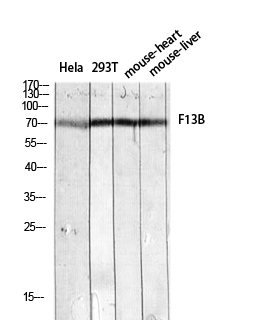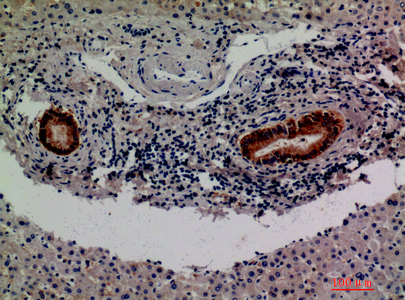

| WB | 咨询技术 | Human,Mouse,Rat |
| IF | 咨询技术 | Human,Mouse,Rat |
| IHC | 1/50-1/100 | Human,Mouse,Rat |
| ICC | 技术咨询 | Human,Mouse,Rat |
| FCM | 咨询技术 | Human,Mouse,Rat |
| Elisa | 1/10000 | Human,Mouse,Rat |
| Aliases | F13B; Coagulation factor XIII B chain; Fibrin-stabilizing factor B subunit; Protein-glutamine gamma-glutamyltransferase B chain; Transglutaminase B chain |
| Entrez GeneID | 2165 |
| WB Predicted band size | Calculated MW: 76 kDa; Observed MW: 65 kDa |
| Host/Isotype | Rabbit IgG |
| Antibody Type | Primary antibody |
| Storage | Store at 4°C short term. Aliquot and store at -20°C long term. Avoid freeze/thaw cycles. |
| Species Reactivity | Human |
| Immunogen | The antiserum was produced against synthesized peptide derived from the Internal region of human F13B. AA range:500-550 |
| Formulation | Purified antibody in PBS with 0.05% sodium azide,0.5%BSA and 50% glycerol. |
+ +
以下是3-4篇关于Factor XIII抗体的参考文献及其简要摘要:
---
1. **文献名称**: *Autoantibodies against coagulation Factor XIII: A case report and literature review*
**作者**: Souri, M., et al.
**摘要**: 该文献报道了一例因FXIII自身抗体导致获得性FXIII缺乏的病例,分析了抗体的IgG亚型及抗原结合特性,并探讨了免疫抑制治疗(如利妥昔单抗)对清除抗体和恢复凝血功能的效果。
2. **文献名称**: *Development of a novel ELISA for detection of Factor XIII inhibitors*
**作者**: Kohler, H.P., et al.
**摘要**: 研究建立了一种高灵敏度的ELISA方法,用于检测FXIII抗体,验证其在诊断获得性FXIII缺乏症中的特异性与临床应用价值,并比较了不同检测技术的优劣。
3. **文献名称**: *Epidemiology and clinical significance of anti-Factor XIII antibodies in autoimmune disorders*
**作者**: Ichinose, A., et al.
**摘要**: 综述了FXIII抗体在系统性红斑狼疮、类风湿性关节炎等自身免疫性疾病中的发生率及临床关联性,强调抗体可能通过干扰FXIII交联功能导致出血或血栓并发症。
4. **文献名称**: *Factor XIII deficiency caused by inhibitory antibodies: A therapeutic challenge*
**作者**: Hsieh, L., et al.
**摘要**: 分析多例FXIII抗体介导的获得性缺乏症患者的治疗策略,提出联合血浆置换、免疫球蛋白输注及免疫抑制剂的治疗方案,并评估长期预后。
---
以上文献可通过PubMed或学术数据库检索具体期刊信息。若需更详细的文献信息,请告知具体方向(如检测技术、临床治疗等)。
Factor XIII (FXIII) antibodies are critical tools in understanding the role and regulation of Factor XIII, a key enzyme in the coagulation cascade. FXIII, a transglutaminase, stabilizes blood clots by cross-linking fibrin polymers and inhibiting fibrinolysis. It circulates as a heterotetramer (A₂B₂) composed of catalytic A subunits (encoded by F13A1) and regulatory B subunits (encoded by F13B). FXIII deficiency, either congenital or acquired, leads to bleeding disorders due to unstable clots. Antibodies targeting FXIII are used in diagnostics and research to quantify FXIII levels, assess functional activity, or localize the protein in tissues. Monoclonal and polyclonal antibodies enable techniques like ELISA, Western blotting, and immunohistochemistry.
Autoantibodies against FXIII, though rare, are linked to acquired FXIII deficiency, causing spontaneous bleeding. These inhibitory antibodies may arise in autoimmune conditions (e.g., systemic lupus erythematosus) or idiopathic cases. Detection of such autoantibodies is vital for diagnosis and guiding immunosuppressive therapies. Conversely, therapeutic antibodies modulating FXIII are explored for managing bleeding or thrombotic disorders. Research on FXIII antibodies continues to clarify their structural interactions, pathogenicity in autoimmune contexts, and potential therapeutic applications, bridging gaps in hematology and immunology.
×